
Bill Maurer, Director
Jenny Fan, Institute Administrator
John Seaman, Administrative Analyst
Ursula Dalinghaus, Postdoctoral Scholar
Mrinalini Tankha, Postdoctoral Scholar
Nima L. Yolmo, Graduate Research Assistant
|
Director's Message
In her article in the African Technopolitan, IMTFI Postdoctoral Fellow Mrinalini Tankha invited her readers to remember the state
of telecommunications 10 short years ago: iPhones had just gone on the market, and M-
Pesa was launched in Kenya. Today, it’s hard to imagine the world without either. The
former redefined mobile communications, disrupted major industries and sparked a
revolution in personal, portable computing. The latter reached countrywide scale within
Kenya, providing access to digital payment and with it broader financial services for
the poor. It also captured the imagination of the policy, research, development and
industry communities concerned with poverty alleviation and financial inclusion. That’s
where IMTFI came in, studying the social and behavioral aspects of money, providing
insights that are relevant for the developing world, and explaining shifts in the payment industry right here at home in the US.
It’s interesting to reflect on where we’ve been these past ten years as we look to the
next ten. If M-Pesa incited great hope about digital financial inclusion, today the
demonetization of high value banknotes in the world’s most populous democracy incites
consternation and even fear. If M-Pesa provided the models—technological, regulatory,
programmatic—for similar mobile money services worldwide, today we can more soberly reflect on
the real opportunities as well as the risks, and speak more thoughtfully about
responsible digital financial inclusion...while also
remembering that there are still vast areas of the planet, even in the United States,
that we might characterize as payments deserts, places
where the means of payment at your disposal can lock you out of certain consumer and community relationships.
Since 2008, IMTFI has been forging a path through the complicated thicket of payment
technologies as they intertwine with everyday monetary mediums and practices, from gold
to goats, from places where multiple currencies circulate together as the norm to places where
money itself—though it’s hard to believe in the 21st century—is still a relatively new
arrival on the economic scene.
With our most recent cohort, IMTFI is now a
global network of 187 researchers in 47 different countries. It has impacted the
industry and policy discussion by providing on-the-ground, user-centered perspectives on
money and its technologies, and by asking the right questions in each context while synthesizing lessons learned
across them. Its final reports, working papers and blog are a plethora of insights and
voices simply not heard from in other forums. We are proud of this, and look forward to
continuing to work with our network and our constituencies to serve the goal of making
sure monetary technologies work for all people.
IMTFI will be taking a pause from issuing calls for new research proposals as we analyze
the rich material we’ve collected over the years, curate the many artifacts and stories that have become
important to our stakeholders, and
continue to follow patterns and paths identified by our researchers.
Working with our new International Board, we are
launching regional centers which are now carrying on the important work of research
dissemination and outreach. I am delighted to announce three upcoming convenings, at
Habib University in Karachi, Pakistan, ICESI University
in Cali,
Colombia, and CIESAS Occidente in Mexico City, through which
our research community will engage new partners while sharing the unique model and
findings of IMTFI research. Stay tuned for details of the upcoming workshop, "Digital
Payments, Financial Inclusion and the Future of Money in Africa," location TBD!
We have also embarked on a partnership with the Filene Research Institute on its Center for Excellence in Emerging Technology, to explore the implications of
fintech for the credit union movement. We are excited to see what new paths this
collaboration will open up.
And we invite you to reach out, dialogue with us, as well as keep up with our
publications (some of which are noted below) and our social media. We hope to continue to
work with our researchers, existing partners, and new supporters to influence
innovations and policies related to monetary technologies in order to serve communities;
to translate research into action; and to foster a more inclusive global conversation on
financial inclusion.
Bill Maurer, Director
|
|
Demonetization in India
In IMTFI's special PERSPECTIVES blog series, IMTFI fellows take on the recent demonetization move in India. Series contributors assess the impact of demonetization from the ground up and raise important questions about what we can learn for digital financial inclusion going forward. A curated blog post provides an analysis and overview of the series, with links to each post. The series has received a lot of interest and has been featured on the Socializing Finance Blog with a new introduction and re-posted at the Charisma Consumer Market Studies Blog.
|

|
|
Filene Center of Excellence for Emerging Technology
Announcement! IMTFI and Filene Research Institute - a credit union and consumer finance think tank in Wisconsin - have co-launched the Filene Center of Excellence for Emerging Technology at University of California, Irvine to study how emerging technologies affect credit union business practices and clients.
|

|
|
featured:
"Riding the Rails of Mobile Payments: Financial Inclusion, Mobile Phones, and Infrastructure"
Stephen Rea, Ursula Dalinghaus, Taylor Nelms and Bill Maurer
In The Routledge Companion to Digital Ethnography by Larissa Hjorth, Heather Horst, Anne Galloway and Genevieve Bell, eds
More...
"Money That Isn't: A Qualitative Examination of the Adoption of the 1 Pesewa Coin and Biometric Payment Cards in Ghana"
Vivian Dzokoto, Rebecca Asante and John K. Aggrey
Ghana Studies, Vol 19 (2016), pp. 3-34
More...
|
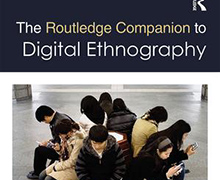

|
|
 "On the Limits of Trust: Characterising Automated Teller Machine Fraudsters in Southwest Nigeria"
"On the Limits of Trust: Characterising Automated Teller Machine Fraudsters in Southwest Nigeria"
Oludayo Tade and Oluwatosin Adeniyi,
Journal of Financial Crime Vol. 23 No. 4, 2016 pp. 1112-1125
|
 "The Changing Face of Money: Preferences for Different Payment Forms in Ghana and Zambia" "The Changing Face of Money: Preferences for Different Payment Forms in Ghana and Zambia"
Vivian Dzokoto, Appiah, E., Chitwood, P.L., & Imasiku, M.,
Journal of Applied Business and Economics, 18 (4), 2016 66-81.
|
 "Between Memorialization and Monetary Re-Valuation: The 1990 Currency Union as a Site of Post-Unification Memory Work"
"Between Memorialization and Monetary Re-Valuation: The 1990 Currency Union as a Site of Post-Unification Memory Work"
Ursula M. Dalinghaus in Money in the German-Speaking Lands. Forthcoming Aug 2017
|
|
 "Financial Practices on 'the Borderlands'(La Linea) in Times of Crisis" "Financial Practices on 'the Borderlands'(La Linea) in Times of Crisis"
Magdalena Villarreal and Lya Nino in Human Organization, by SfAA, Society for Applied Anthropology, Summer 2016, Vol. 75, No. 2, pp. 151-158.
|
 "Monetary Practices of Traditional Rural Communities in Ethiopia: Implications for New Financial Technology Design"
"Monetary Practices of Traditional Rural Communities in Ethiopia: Implications for New Financial Technology Design"
Mesfin F. Woldmariam, Gheorghita Ghinea, Solomon Atnafu & Tor-Morten Groenli in Human-Computer Interaction, Vol. 31, Iss. 6, 2016
|
 "Examining consumer adoption and perception of Mobile Money in Ghana" "Examining consumer adoption and perception of Mobile Money in Ghana"
Edwin Clifford Mensah and Zhixin Kang in International Journal of Electronic Finance,
Forthcoming Summer 2017
|
|
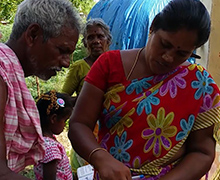
It pays to use prepaid cards to deliver services to MFI clients: study
Debashis Acharya and Tapas Kumar Parida
The Hindu BusinessLine |

Banking fraud is costing the Nigerian economy dearly
Oludayo Tade and Oluwatosin Adeniyi
The Conversation |
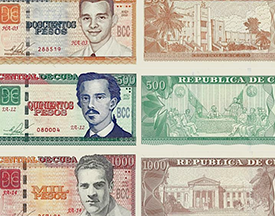
The Heads and Tails of Monetary Duality
Mrinalini Tankha
Cuba Counterpoints |
|

2017s Best & Worst Cities at Money Management
Interview with Bill Maurer
WalletHub |
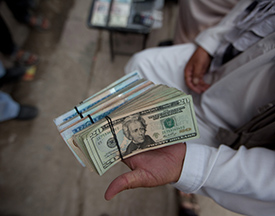
CFI ACCION: A U.S. Agenda for Global Financial Inclusion
photo featured |
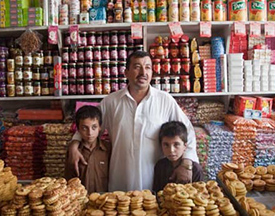
Devex: New research finds opportunity in the cashless ecosystem
photo featured |
|

Devex: Reaching the last mile: The future of medicine access for everyone
photo featured |

Islamische Zeitung IZ: Warum, Burka-Verbot das Sinnbild einer Scheindebatte ist
photo featured |
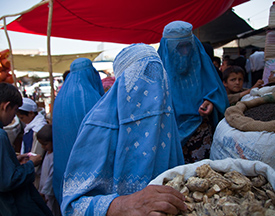
PolskieRadiopl: Bulgaria: bedzie zakaz noszenia burek? Stanowisko prokuratora
photo featured |
|
Collaborations and Public Engagements
|
|
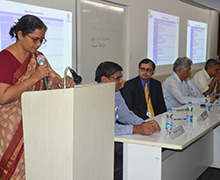
No cash, no intermediaries? Different scenarios for a digital economy, India
Workshop included representatives from Microsoft Research, Gates Foundation India, National Payments Corporation of India, Gujarat Institute of Development Research, Eko |
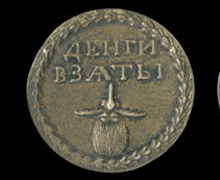
British Museum/Citi -
Money Matters
New Educational Display at the British Museum |
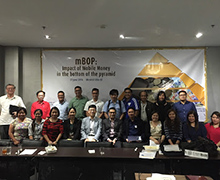
mBOP: The Impact of Mobile Financial Services in the Bottom of the Pyramid, Philippines
The dissemination event brought together cash transfer agencies, NGOs and other stakeholders including banking associations, USAID, Oxfam, Save the Children, and DSWD, Land Bank. |
|
 Experimenting with Money, Objects, and Repertoires, at the CoLED Conference on Ethnography and Design: Mutual Provocations Experimenting with Money, Objects, and Repertoires, at the CoLED Conference on Ethnography and Design: Mutual Provocations
Postdoctoral Scholars Mrinalini Tankha and Ursula Dalinghaus conducted a workshop, Experimenting with Money, Objects, and Repertoires, at the CoLED Conference on Ethnography and Design: Mutual Provocations, at UC San Diego on October 28, 2016. The interactive workshop featured exercises based on IMTFI's repertoire of tools and research methods and encouraged participants to think about monetary instruments as objects of analysis that reveal the complex negotiations that people make in their everyday financial lives.
|
|
Don't forget to subscribe to the IMTFI Blog for weekly posts that are written by funded fellows sharing their research results, notes in the field, or announcements-they're full of rich reports and amazing photos, you won't be disappointed!
|
|
 Hearthholds of Mobile Money in Western Kenya
Hearthholds of Mobile Money in Western Kenya
Sibel Kusimba
 Cashlite or Cashless? It Depends on the Financial Ecosystem
Cashlite or Cashless? It Depends on the Financial Ecosystem
Vivian Dzokoto & Mwiya Imasiku
 Can I try again? Working with research participants as they map their networks
Can I try again? Working with research participants as they map their networks
Maria Balen
 Is the Rural Hometown a Worthwhile Investment?
Is the Rural Hometown a Worthwhile Investment?
Alvin P. Ang and Jeremaiah M. Opiniano
 Women, Social Capital, and Financial Inclusion: Linking Customer Data with Ethnographic Perspectives
Women, Social Capital, and Financial Inclusion: Linking Customer Data with Ethnographic Perspectives
Sibel Kusimba
 How is digital payment working for women in rural India?
How is digital payment working for women in rural India?
Deepti KC
 New ROSCA Board Game at the Mekong Financial Inclusion Forum
New ROSCA Board Game at the Mekong Financial Inclusion Forum
Andrew Crawford
|
 Mobile Phones, Insurance and a Funeral: A Closer Look at South Africa’s Mobile Micro-Insurance Market
Mobile Phones, Insurance and a Funeral: A Closer Look at South Africa’s Mobile Micro-Insurance Market
Christopher Paek
 Object-Centered Focus Group Discussions: Stimulating Conversations On Mobile Money Practices and Culture
Object-Centered Focus Group Discussions: Stimulating Conversations On Mobile Money Practices and Culture
Milcah Mulu-Mutuku, Castro Ngumbu Gichuki
 Diverse Strategies of Banking Fraud in Nigeria
Diverse Strategies of Banking Fraud in Nigeria
Oludayo Tade, Oluwatosin Adeniyi
 Negotiating and Converting Money in Zimbabwe’s Multicurrency Environment
Negotiating and Converting Money in Zimbabwe’s Multicurrency Environment
Mahiya I.T, Gukurume S.
 Maurer named AAAS Fellow
Maurer named AAAS Fellow
 Understanding the Spread of Sports Betting in Uganda
Understanding the Spread of Sports Betting in Uganda
Sylvan Herskowitz
 Review Post: Monetary Practices of Traditional Rural Communities in Ethiopia: Implications for New Financial Technology Design
Review Post: Monetary Practices of Traditional Rural Communities in Ethiopia: Implications for New Financial Technology Design
|
 Influence of Mobile Money on Control of Productive Resources among Women Micro Entrepreneurs Participating in Table Banking in Nakuru, Kenya
Influence of Mobile Money on Control of Productive Resources among Women Micro Entrepreneurs Participating in Table Banking in Nakuru, Kenya
Milcah Mulu-Mutuku, Castro Ngumbu Gichuki
 “When I make sales, I want to sit and count my money at the end of the day”: Low Adoption of Digital Payment Platforms among SMEs in Ghana
“When I make sales, I want to sit and count my money at the end of the day”: Low Adoption of Digital Payment Platforms among SMEs in Ghana
Clement Adamba
 Ceremonial Expenses as Relational Savings
Ceremonial Expenses as Relational Savings
Isabelle Guerin, Santosh Kumar and G. Venkatasubramanian
 Intermediaries, Cash Economies, and Technological Change in Myanmar and India (Part 1)
Intermediaries, Cash Economies, and Technological Change in Myanmar and India (Part 1)
Janaki Srinivasan, Elisa Oreglia
 Intermediaries, Cash Economies, and Technological Change in Myanmar and India (Part 2)
Intermediaries, Cash Economies, and Technological Change in Myanmar and India (Part 2)
Janaki Srinivasan, Elisa Oreglia
|
|

















